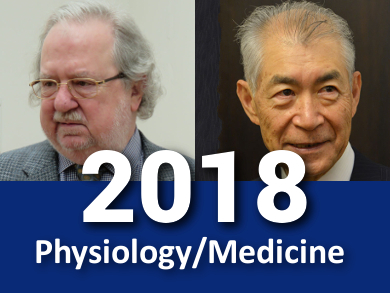The Nobel Prize in Physiology or Medicine 2018 has been awarded jointly to
- James P. Allison (pictured left), University of Texas MD Anderson Cancer Center, Houston, TX, USA, and
- Tasuku Honjo (pictured right), Kyoto University, Japan,
“for their discovery of cancer therapy by inhibition of negative immune regulation.”
The researchers’ work led to a completely new principle of cancer treatment, which takes advantage of the immune system’s ability to attack cancer cells. They have developed strategies for inhibiting certain “brakes” on the immune system and stimulating its ability to fight cancer. The resulting cancer treatments, often referred to as “immune checkpoint therapy”, have shown remarkable results.
James P. Allison studied a known protein, CTLA-4 (cytotoxic T-lymphocyte-associated protein 4), which functions as a brake on the immune system’s T cells. He realized the possibility of “releasing” this brake by using an antibody that can bind to CTLA-4, block its function, and allow the immune cells to attack cancer. He then developed this concept into an approach for treating patients.
Tasuku Honjo discovered PD-1 (programmed cell death protein 1), another protein on the surface of T-cells. He revealed that it also operates as a brake, but with a different mechanism of action. Therapies based on his discovery proved to be very effective in the fight against cancer.
James P. Allison, born in 1948 in Alice, TX, USA, received his Ph.D. from the University of Texas, Austin, USA, in 1973. From 1974 to1977, he was a Postdoctoral Researcher at the Scripps Clinic and Research Foundation, La Jolla, CA, USA. He then served as a Faculty Member at the University of Texas System Cancer Center, Smithville, USA. From 1985 to 2004, he was a Faculty Member at the University of California, Berkeley, USA, and from 2004 to 2012, he worked at Memorial Sloan-Kettering Cancer Center, New York, USA. He then was as an Investigator at the Howard Hughes Medical Institute, Chevy Chase, MD, USA. Since 2012, Allison has served as Professor at the University of Texas MD Anderson Cancer Center. He is also affiliated with the Parker Institute for Cancer Immunotherapy, San Francisco, CA, USA.
Tasuku Honjo, born in 1942 in Kyoto, Japan, received his M.D in 1966. From 1971 to 1974, he was a Research Fellow at the Carnegie Institution of Washington (CIW), Baltimore, and at the National Institutes of Health (NIH), Bethesda, both MD, USA. He received his Ph.D. from Kyoto University in 1975. From 1974 to 1979, he was Assistant Professor of Medicine at Tokyo University, and from 1979 to 1984, he was Professor of Genetics at Osaka University, both Japan. Since 1984, he has served as Professor at Kyoto University.
Selected Publications by James P. Allison
- Enhancement of Antitumor Immunity by CTLA-4 Blockade,
D. R. Leach, M. F. Krummel, J. P. Allison,
Science 1996, 271, 1734–1736.
https://doi.org/10.1126/science.271.5256.1734 - Manipulation of T cell costimulatory and inhibitory signals for immunotherapy of prostate cancer,
E. D. Kwon, A. A. Hurwitz, B. A. Foster, C. Madias, A. L. Feldhaus, N. M. Greenberg, M. B. Burg, J. P. Allison,
Proc. Natl. Acad. Sci. 1997, 94, 8099–8103.
https://doi.org/10.1073/pnas.94.15.8099 - Biologic activity of cytotoxic T lymphocyte-associated antigen 4 antibody blockade in previously vaccinated metastatic melanoma and ovarian carcinoma patients,
F. S. Hodi, M. C. Mihm, R. J. Soiffer, F. G. Haluska, M. Butler, M. V. Seiden, T. Davis, R. Henry-Spires, S. MacRae, A. Willman, R. Padera, M. T. Jaklitsch, S. Shankar, T. C. Chen, A. Korman, J. P. Allison, G. Dranoff,
Proc. Natl. Acad. Sci. 2003, 100, 4712–4717.
https://doi.org/10.1073/pnas.0830997100
Selected Publications by Tasuku Honjo
- Induced expression of PD-1, a novel member of the immunoglobulin gene superfamily, upon programmed cell death.,
Y. Ishida, Y. Agata, K. Shibahara, T. Honjo,
EMBO J. 1992, 11, 3887–3895.
https://doi.org/10.1002/j.1460-2075.1992.tb05481.x - Development of Lupus-like Autoimmune Diseases by Disruption of the PD-1 gene encoding an ITIM motif-carrying immunoreceptor,
Hiroyuki Nishimura, Masato Nose, Hiroshi Hiai, Nagahiro Minato, Tasuku Honjo.
Immunity 1999, 11, 141–151.
https://doi.org/10.1016/S1074-7613(00)80089-8 - Engagement of the Pd-1 Immunoinhibitory Receptor by a Novel B7 Family Member Leads to Negative Regulation of Lymphocyte Activation,
Gordon J. Freeman, Andrew J. Long, Yoshiko Iwai, Karen Bourque, Tatyana Chernova, Hiroyuki Nishimura, Lori J. Fitz, Nelly Malenkovich, Taku Okazaki, Michael C. Byrne, Heidi F. Horton, Lynette Fouser, Laura Carter, Vincent Ling, Michael R. Bowman, Beatriz M. Carreno, Mary Collins, Clive R. Wood, Tasuku Honjo,
J. Exp. Med. 2000, 192, 1027–1034.
https://doi.org/10.1084/jem.192.7.1027 - PD-1 blockade inhibits hematogenous spread of poorly immunogenic tumor cells by enhanced recruitment of effector T cells,
Yoshiko Iwai Seigo Terawaki Tasuku Honjo,
Int. Immunol. 2004, 17, 133–144.
https://doi.org/10.1093/intimm/dxh194
Also of Interest
- Who’s Next? Nobel Prize in Chemistry 2018,
ChemViews Mag. 2018.
Make your predictions for the 2018 Nobel Prize in Chemistry
- Nobel Prize in Physiology or Medicine 2017,
ChemViews Mag. 2017.
The prize was awarded to J. C. Hall, M. Rosbash, and M. W. Young, all USA, for their discoveries related to the biological clock - The Nobel Prize,
Veronika Belusa,
ChemViews Mag. 2015.
Collection of information on the Nobel Prize




